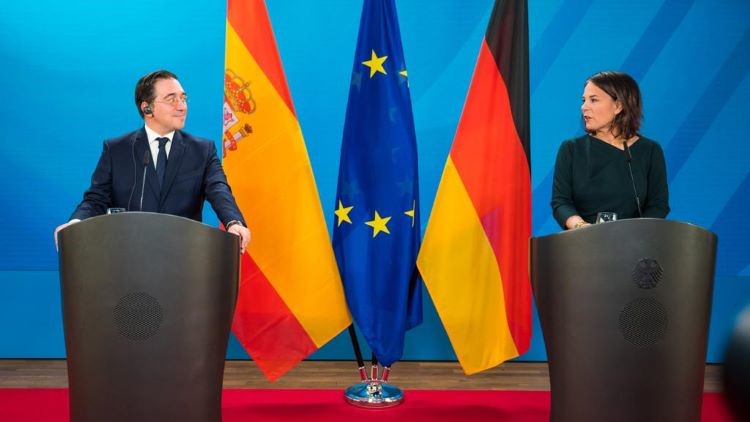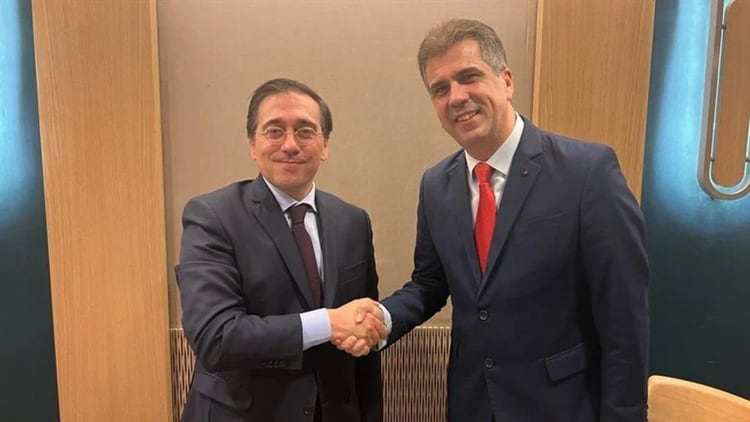The Diplomat
The Minister of Foreign Affairs, José Manuel Albares, and his German counterpart, Annalena Baerbock, yesterday called for more “solidarity” among all EU countries on migration issues because “solidarity is indivisible” and it is not acceptable that some countries claim structural funds while refusing to accept their quota of migrants and refugees.
Germany and Spain agree “that Africa and migration have become a priority for everyone,” the minister said during his joint press conference with Baerbock, after meeting with her at the German Foreign Ministry headquarters in Berlin to address the priorities of the upcoming Spanish Presidency of the EU.
“Both countries agree that this is a European issue,” he said. “When the challenge is European, the response can only be European,” because migrants “come to Europe, and not to this or that country,” he warned. “It is urgent to reach agreements” and, therefore, Spain will address this problem “constructively” and will do “everything possible to find a consensus” during the Spanish Presidency, he assured.
In this sense, Albares defended the “successful formulas” developed by Spain in migratory matters, with special attention to the so-called external dimension and the collaboration with the countries of origin and transit through development programs and cooperation in the fight against mafias. According to the minister, some people have the right to seek asylum and refuge in the EU and others are “legitimately seeking to improve their lives” and therefore resort to the “wrong path” of irregular migration. For this reason, he warned, it is necessary to “create conditions so that there can be regular migration and to discourage” irregular migration.
Apart from this, he continued, there is an “internal dimension” within the EU-27 based on the combination of “responsibility and solidarity”, because “solidarity is indivisible” and “has to be extended to all EU states, it cannot be à la carte”. In this respect, Albares criticized those countries (such as Hungary) which, while demanding structural funds, refuse to collaborate in migratory matters.
For her part, Baerbock warned that the migration and asylum pact “is one of the most important, but also one of the most difficult” projects of the European Union because “it is not acceptable that a common solution has not yet been found”. According to the head of German diplomacy, Europe must equip itself with “fair and regulated procedures” for the distribution of refugees and for the repatriation of migrants who do not have the right to asylum, always with “order and humanity”, since “the face we show at the external borders is the face with which Europe is seen in the world”.
“We need more solidarity and not to abandon the border states,” said Baerbock, who assured that Germany will support Spain in its efforts to reach an agreement on this matter during the Spanish Presidency. “There may be different points of view, but, in the end, we will have to reach a consensual agreement,” she added.
Regarding other issues, Albares assured that “Germany is a key partner for Spain and a fundamental driving force for the European Union” and both countries have “a very strong and consolidated bilateral relationship that is projected in all areas”. He also highlighted the coincidences between the two governments “in the global agenda, marked by the consequences of the Russian aggression in Ukraine and the repercussions in all countries of the world”.
“We are allies in NATO and partners in the EU, and we share an active and close position in all security initiatives,” including their “commitment to the security of NATO’s eastern flank, something that is reflected in the presence of troops from both countries in the Baltics, and in the countries of Eastern Europe,” he continued. “Of course, we are fully aligned in strongly condemning Putin’s brutal, unjust and unjustified aggression and in permanently demanding a ceasefire over Ukraine,” he added.
Bundestag, Minister for Cooperation and Ambassadors’ Conference
Apart from his meeting with Baerbock, Albares addressed the European Affairs Committee of the Bundestag (Lower House). “I was the first Foreign Minister to address the Committee,” with whom “I exchanged on the priorities of the Presidency and the vision of Spain and Germany in this regard,” he later told the press. Among the topics discussed with the deputies, he highlighted the Migration and Asylum Pact, the reform of European economic governance and the electricity market, and the European Health Union.
He also met the Minister for Economic Cooperation and Development, Svenja Schulze, and concluded his day in Berlin with a speech at the conference of German ambassadors accredited to EU countries at the Foreign Office. “I am the first Foreign Minister who has had the honor of being invited to address the conference of ambassadors,” before whom “I have explained the priorities of our Spanish Presidency,” he told the press.
Among the issues addressed with the ambassadors, he highlighted the need to boost relations between the EU and Latin America and to take advantage of the “historic opportunity” of the Spanish Presidency to close the agreements with Mercosur, Chile and Mexico. He also assured that Spain will support “the European perspective of the candidate countries, offering them a realistic horizon, recognizing their efforts and accompanying their reforms”.







